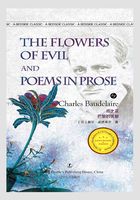
THE COUNTERFEIT MONEY
As we were moving away from the tobacconist's,my companion carefully sorted his money: in the left pocket of his waistcoat he slipped little gold pieces; in the right, little silver pieces; in the left pocket of his trousers, a mass of coppers, and finally,in the right, a silver two-franc pieces that he had particularly examined.
"Singular and minute distribution!" I said to myself.
We came across a pauper who, trembling, held forth his cap.—I know nothing more disquieting than the dumb eloquence of those suppliant eyes which hold,for the sensitive man who can read within, both so great humility and so deep reproach. Something lies there which approaches that depth of complex feeling in the tearful eyes of dogs that are being flogged.
The offering of my friend was much more considerable than mine, and I said to him: "You are right; after the pleasure of being astonished, none is greater than that of creating a surprise."—"It was the counterfeit," he answered tranquilly, as though to justify his prodigality.
But in my miserable brain, always busied seeking noon at two p.m. (of such a wearying faculty has nature made me a gift!), the idea suddenly came that such conduct, on the part of my friend, was excusable only by the desire to produce an occasion in the life of the poor devil, perhaps even to know the diverse consequences, disastrous or otherwise, that a counterfeit in the hands of a mendicant can engender.Could it not multiply itself in valid pieces? Could it not also lead him to jail? A tavern-keeper, a baker,for example, might perhaps have him arrested as a forger or a spreader of counterfeits. Quite as well the counterfeit coin might be, for a poor little speculator,the germ of a several days' wealth. And so my fancy ran its course, lending wings to the spirit of my friend and drawing all possible deductions from all imaginable hypotheses.
But he abruptly burst my revery asunder by taking up my own words: "Yes, you are right: there is no sweeter pleasure than to surprise a man by giving him more than he expected."
I looked into the whites of his eyes, and I was frightened to see that his eyes shone with an undeniable candor. I then saw clearly that he wished to combine charity and a good stroke of business; to gain forty sous and the heart of God; to sweep into Paradise economically; in short, to entrap gratis the brevet of charitable man.
I would almost have pardoned in him the desire of the criminal joy of which I had just now thought him capable! I would have thought it curious, singular,that he found it amusing to compromise the poor; but I shall never pardon the ineptitude of his calculation.One is never to be forgiven for being wicked, but there is some merit in being conscious that one is;—the most irreparable of all evils is to do wrong through stupidity.